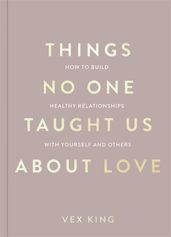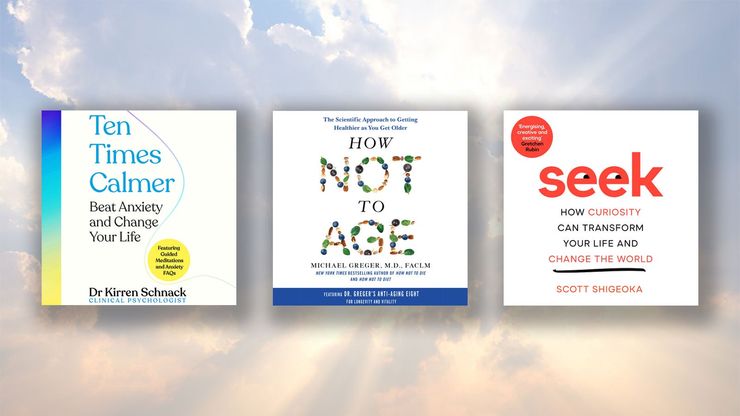Healthy differences welcome: Vex King on how to disagree well with your partner
Bestseller Vex King, author of Things No One Taught Us About Love, tells us how to successfully navigate disagreements in your relationship.

Differences in opinion don't have to escalate into full-scale rows. In this edited extract from Closer to Love, the forerunner to Things No One Taught Us About Love, Sunday Times-bestselling mind coach Vex King explains how to disagree fairly.
You are bound to have disagreements with your partner, and these bumps in the road aren’t all bad. Not seeing eye to eye on everything is a sign of two unique individuals who are challenging each other’s perspective and will. This can be a healthy dynamic which helps you to learn and grow: not everything has to be a battle of wills about who’s right and who’s wrong.
‘Not seeing eye to eye on everything is a sign of two unique individuals who are challenging each other’s perspective and will. This can be a healthy dynamic which helps you to learn and grow: not everything has to be a battle of wills about who’s right and who’s wrong.’
While you might say that you are constantly arguing over nothing, the truth is that there’s a lot going on under the surface. As you get to know the other person better, power struggles may increase – who needs to be right all of the time and who backs down first? It can become irritating when your partner doesn’t agree with you and is always contradicting or opposing you. That may be upsetting or make you angry, with thoughts turning to things like, ‘Perhaps they’re not so perfect after all,’ creeping in. Arguments and intense differences of opinion can be stressful and, depending on your personality type, might make you want to fight head on or withdraw to a corner.
What starts out as a casual comment from one side might end up in nit-picking, screaming, and even tears, as both get into a cycle of ‘who said what’ over and over again. That can feel like reaching a dead end where you never see eye to eye on anything any more. If you begin from a place of genuine care and respect for your partner, you have to accept that there will be differences of opinion. Rather than becoming too overbearing or passive, there are ways to de-escalate conflict and solve the problem.
How about being your own referee, stopping the game when you see a foul? Or agree to disagree before it even gets there. No one likes dirty players, and even if you score a goal, what price does that come at? Follow the rules of fair play – whether you think you are right or not. Take a time-out to calm things down and regroup – that’s a lot better than letting things get out of control.
Instead of trying to control who is right and who is wrong, take control of the way you argue by de-escalating things. When your partner storms off, banging the door behind them, or the conversation descends into spiteful comments, just STOP!
START listening instead of talking. But listen with your heart, not only your ears. Create a safe space for your partner to express themselves without fear of judgement or criticism. Allow them to talk – it’s often as simple as that. There’s no need to negate their opinions or belittle what they believe, even if you don’t agree with it.
‘Listen with your heart, not only your ears. Create a safe space for your partner to express themselves without fear of judgement or criticism. Allow them to talk – it’s often as simple as that. There’s no need to negate their opinions or belittle what they believe, even if you don’t agree with it.’
Keep an open mind and allow the other person to state their case. You aren’t judge and jury in your relationship and you don’t need to reach a verdict! Maybe you are both right, or both wrong, and who cares? What’s more important is that you provide room for dialogue to take place as you move towards a place of mutual respect and understanding.
Just because you can shout louder than your partner, it doesn’t make you right! If anything, you can come across as intimidating, aggressive, and manipulating, so where’s the harmony in that? Instead of verbal bullying, take a moment to breathe and count to ten. Give yourself time to think more clearly before you say something that you might regret later and avoid getting into slanging matches to prove your point. Relationships shouldn’t be about one-upmanship, and if that’s you, maybe you need to ask yourself why you feel the need to be right all of the time.
Just because you don’t have the same views on politics, religion, or anything else with your partner, doesn’t mean that the relationship isn’t working or that love has come to an end. It’s OK to say, ‘I disagree, but I respect your opinion’. Healthy differences are welcome, but unhealthy ones are not, and you need to know which is which.
Here are some tips for having a productive disagreement and resolving conflict
- Mirror the complaint: ‘So, what you’re saying is . . .’
- Take responsibility for what you did or said that is upsetting your partner.
- Focus on the topic and resist the urge to bring up past events.
- With your body language, avoid:
– Rolling your eyes: This is blatant disrespect and hurtful. It says, ‘What you’re feeling doesn’t matter to me.’
– Crossing your arms: This action closes you off emotionally. If you find you need to self-soothe, it’s best to table the talk for another time.
– Looking around the room or at distractions: It’s hard to really hear and feel what someone’s saying if you’re not looking at them.
‘If you reach the point where you feel that the trust between you has been broken or have noticed a change in intimacy on any level, it will require a deeper, more honest look at what is happening between the two of you.’
If you reach the point where you feel that the trust between you has been broken or have noticed a change in intimacy on any level, it will require a deeper, more honest look at what is happening between the two of you.
Another thing to note is that when a small disagreement snowballs into an unhinged battlefield in the living room, there are clearly underlying issues with one or both partners. These issues can be within the relationship or completely separate.
The more attuned you are to your emotions, the more you’ll be able to understand your reactions and why a conversation triggers an outburst. In any case, you always have the power to be compassionate and diffuse any situation.
Things No One Taught Us About Love
by Vex King
The hope and expectation that romantic love can and will be the solution to all our problems can put real strain on our relationships. Learn how to strengthen them, and uncover the true nature of love – a force within us, rather than an external power – with Vex King. By deconstructing the myths and misconceptions surrounding love and relationships, this book will help you to understand yourself, create and maintain healthy habits, set boundaries and heal.
Unlock the secrets to success with these top books for success.



